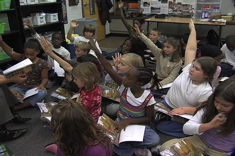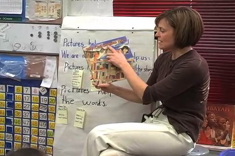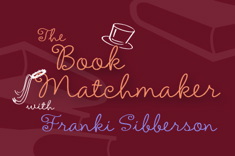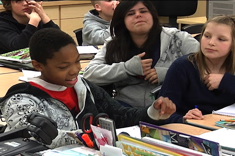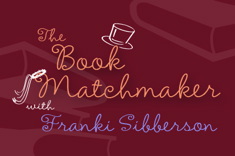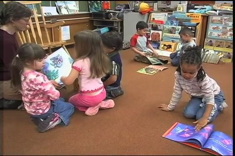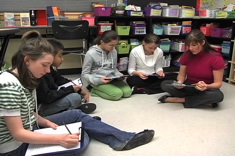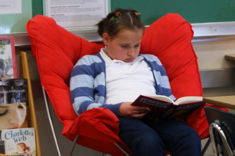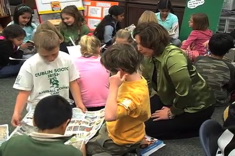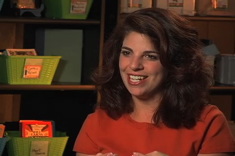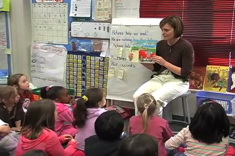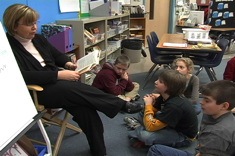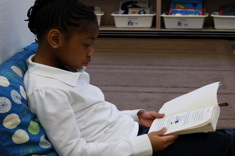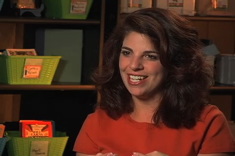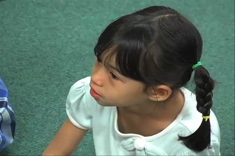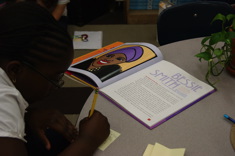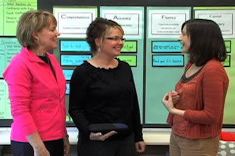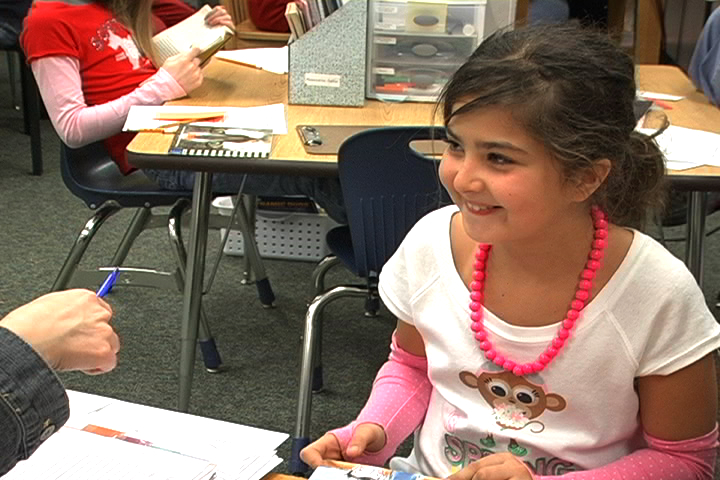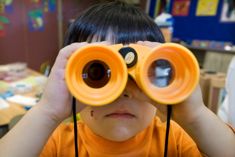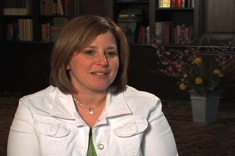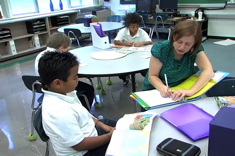Teaching Reading
Our contributors lead reading workshops in classrooms with creative flair. Over the past 12 years, we've filled our site with loads of suggestions, tools, and tips for using engaging books throughout the curriculum to hook kids on reading. Here is where you will find many stories of successful and not-so-successful workshop days, and what we learned from them. We bring these stories to life through hundreds of video examples.
Latest Content
Next Steps: Thinking about Retelling During Reading
Retelling is an essential skill for readers, and it’s one that is crucial for success on most state exams too. In Part 2 of a two-part series, Clare Landrigan and Tammy Mulligan share strategies and sample lessons in this installment.
Reading Preferences: Social, Pleasurable, and Sometimes Awkward
Karen Terlecky connects an honest appraisal of her reading habits with an unvarnished look at her 5th grade students.
Primary Series Study
Katie DiCesare describes the primary series study unit she completes with her 1st and 2nd graders, combining reading, writing, and community building.
Book Matchmaker: Teaching Point of View
In this installment of Book Matchmaker, Franki Sibberson provides a range of books for teaching point of view for grades 3-5 students.
Uncovering Reading Behaviors
Teachers value the assessment of student skills and needs that come from close observation in classrooms, but may not know how to focus those observations. Ruth Shagoury documents some of those behaviors that put students on the path of becoming accomplished independent readers in a middle school classroom.
Content Connections in Reading Workshop
In this four-minute video, Andrea Smith confers with a 4th grade student interested in immigration, helping her set up an independent reading and learning plan.
Revising Titles Minilesson
In this minilesson from Franki Sibberson’s grades 3 and 4 classroom, Franki takes students through the process of selecting and revising titles. She uses the poem “Confessions of a Reader” by Carol Wilcox as a mentor text.
Book Matchmaker: Helping a Struggling Reader in 5th Grade
In this installment of Book Matchmaker, Franki Sibberson shares books and genres a struggling 5th grader might enjoy.
Preschool Book Browsing Time
This five-minute video from Kelly Petrin's preschool classroom shows the value of book browsing time. Kelly explains the skills children develop in language, book handling skills, and literacy independence during this time.
Book Matchmaker: New Books for Intermediate Readers
From humor to novels in verse, Franki Sibberson shares her top picks for intermediate readers in this Book Matchmaker.
Linking Reading, Writing, and Getting to Know You Activities During the First Week of Middle School
Want to get your middle school students’ attention on the first day of school? Read a book about how to ruin it for them.
Starting a Newbery Club with Students
If you want to re-energize teen and tween readers in your school, start a Newbery Club. These voluntary groups read, discuss, and take their best guess of which book will win the coveted award in mid-January.
Using Comics in Literacy Workshops
Franki Sibberson works with her 3rd and 4th graders to use comics in the literacy workshop.
Choosing Mentor Texts for Reading
In this quick take video, Aimee Buckner explains her criteria for selecting mentor texts for small-group, individual, and whole-class instruction.
Book Matchmaker: Short Vowel Practice with Older Students
In this installment of Book Matchmaker, Franki Sibberson tackles the tough question of how to find texts for students who need help with short vowels, but are too old to enjoy many primary texts.
Social Justice Picture Books
If you’re looking for a read aloud to spark some discussions about making a difference in the world, you might enjoy Ruth Shagoury’s new booklist of children’s literature with a social justice theme.
Digging Deeper with Rereading
In this video from Katie DiCesare’s first-grade classroom, Katie uses the strategy of rereading to help students look more closely at words—in this case, words that rhyme.
Reflections on a Year of Read Alouds
Karen Terlecky mulls over a year of read alouds in her 5th grade classroom as she makes plans for the coming year.
Preschool Morning Message
This five-minute video from Melissa Kolb's preschool classroom shows the value of morning message for teaching literacy skills. Melissa explains the skills children develop during this brief whole-class lesson and sharing time.
Launching the Newbery Club
Bill Prosser and Maria Caplin continue their series on a Newbery Club for 5gth graders in their school. In this installment, they write about the launch of the club.
Book Matchmaker: Texts to Inspire Our Youngest Readers and Writers
In this installment of the Book Matchmaker series with Franki Sibberson, Franki helps first-grade teacher Danielle think through what books might spark better writing in her young students who are mostly interested in toys and video games.
Quick Take: Time Constraints in Conferences
In this two-minute video, Aimee Buckner explains how she deals with time constraints when she is conferring with students.
Guiding Readers in Kindergarten: A Planning and Assessment Template
If you’re considering guided reading groups in your kindergarten classroom, you’ll want to read Mandy Robek’s advice for getting started and keeping track with a simple planning and assessment form.
Young Learners and Martin Luther King Day (BOOKLIST)
Teachers of young learners face special challenges in honoring Martin Luther King and dealing with the violent nature of his death at the same time. Mandy Robek offers some insights into how to celebrate King's life with even the youngest students.
Literacy Letters: Helping New Students Understand Ongoing Assignments
How do teachers bring new students up to speed with ongoing assignments? In this video from Katie Doherty’s middle school classroom, Katie presents the latest “Literary Letters” assignment to her 6th graders. It is early spring, and all but two of the students have experience with this writing assignment.
When to Group?
Reading groups are such an ingrained element of our teaching culture that teachers can feel guilty if they choose other instructional methods. In this conversation with fourth-grade teacher Rachel, Joan Moser and Gail Boushey (“The Sisters”) talk about when it makes sense to group students.
Using Picture Books to Spice Up Vocabulary Instruction (BOOKLIST)
Picture books are a terrific tool for vocabulary instruction – students have so much fun reading them they are hardly aware of all the new words they are picking up. Franki Sibberson shares her top picks for spicing up vocabulary instruction in this booklist.
Undercover Coach: Making Time to Work with Children
If you're a literacy coach, the most important question to ask yourself may be this: How much time am I spending in classrooms? Shari Frost writes about how coaches can move beyond a quest for perfect demo lessons to a stance of co-learners with teachers.
Quick Takes: Advice on Book Hogs
In this quick take video, Franki Sibberson gives advice for dealing with "book hogs" — those students who try to grab any new book when it appears in the classroom library.
Book Clubs: Setting the Stage with Conferring
We want students to discuss books in thoughtful, sophisticated ways in book clubs, but those skills don’t always come naturally. (Wait – do those skills ever come naturally?) Beth Lawson explains how she confers with individual children in her third-grade classroom to prepare them for independent book clubs with peers.
Browse Content By
Type
Category
- Assessment Tools
- Big Fresh Archives
- Booklists
- Choice Numeracy
- Classroom Design
- Common Core
- Community Building
- Conferring
- Content Literacy
- Digital Literacy
- English Language Learners
- Equity
- Family Relations
- Free Samples
- Guiding Groups
- Leadership
- Literacy Coaches
- Mentor Texts
- Minilessons
- New Teacher Mentors
- Podcasts
- Poetry
- Quote Collections
- Reading Strategies
- Self Care
- Struggling and Striving Learners
- Talking and Listening
- Teacher Study Groups
- Teaching Reading
- Teaching Writing
- Word Study and Vocabulary
Author
- Melissa Quimby
- Nawal Qarooni
- Gwen Blumberg
- Julie Cox
- The Lead Learners
- Hannah Tills
- Josie Stewart
- Ruth Metcalfe
- Mallory Messenger
- Becca Burk
- Jodie Bailey
- Vivian Chen
- Mary Brower
- Tiffany Abbott Fuller
- Stephanie Affinito
- Ruth Ayres
- Leigh Anne Eck
- Heather Fisher
- Shari Frost
- Julie Johnson
- Suzy Kaback
- Gigi McAllister
- Shirl McPhillips
- Melanie Meehan
- Cathy Mere
- Debbie Miller
- Tara Barnett and Kate Mills
- Tammy Mulligan
- Dana Murphy
- Bitsy Parks
- David Pittman
- Brenda Power
- Heather Rader
- Matt Renwick
- Mandy Robek
- Christy Rush-Levine
- Gretchen Schroeder
- Jen Schwanke
- Brian Sepe
- Katherine Sokolowski
- Stella Villalba
- Jennifer Vincent
Grade Level
Choice Literacy Membership
Articles
Get full access to all Choice Literacy article content
Videos
Get full access to all Choice Literacy video content
Courses
Access Choice Literacy course curriculum and training

